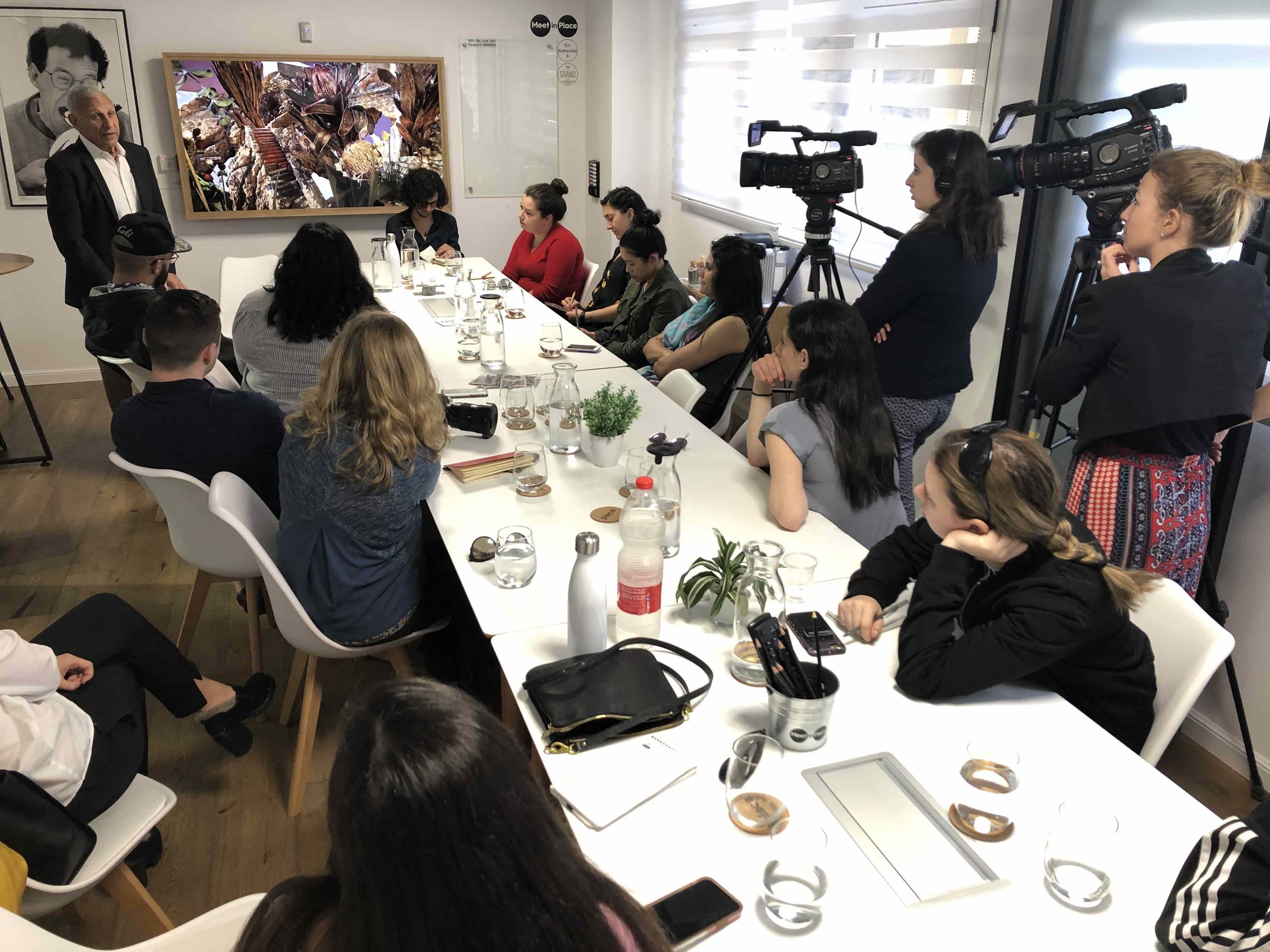Day 11 - Tel Aviv
Today was a series of press conferences where students got to ask questions about politics, journalism and the military.
Former Israeli Air Force Commander Eitan Ben Eliyahu, left, talks to Newhouse students in Tel Aviv.
First up was Eitan Ben Eliyahu, a retired Major General in the Israeli Defense Forces who was the Commander of the Israeli Air Force. As has become customary with nearly everyone we speak to, he began with a history of the conflict between Israelis and Palestinians. Then he dropped the most provocative theory we’ve heard yet: the Palestinians don’t really want their own state, they want to become part of Israel, to eventually take it over. This snapped the students to attention, and they, as good journalists should, immediately asked for proof. Eliyahu affirmed this is his personal opinion, and not one of the Israeli government or military. And, he admitted he wished he didn’t think this way. Still, he offered an example of how he reaches this conclusion:
Just yesterday a Palestinian stabbed a soldier, stole his gun and shot a rabbi, killing them both.
This focuses the attention of the Israeli public on security.
Security is the main issue of current Prime Minister Benjamin Netanyahu. With elections coming in three weeks, the attack plays into his campaign.
Conservative Netanyahu is considered less friendly to the Palestinian cause than liberal candidates.
But, Netanyahu in power allows Palestinians blame a lack of peace on him, rather than disagreements over peace proposal details.
Without a peace agreement, the Palestinians can wait out the Israelis and eventually get to a point where their numbers are so great, they can take over.
So, rather than push toward a solution where they can have their own state next to Israel, Eliyahu believes the Palestinians are sabotaging two-state proposals in favor of a long-term one-state solution where they’re in control of the entire area.
“They don’t want their own state. They want Israel.”
Israeli journalists take questions from Newhouse students.
Next, up, two Israeli journalists talked about how they do their jobs. Everyone in Israel seems willing to talk, but that also means everyone is giving his or her own version of events. Journalists here, they said, must check and double check their facts. That’s the only way to sift through the deluge of interpretations of what’s happened. Of course, that’s good advice for journalists, no matter where they work.
“Israel is made of minorities ... You have to come with previous knowledge.”
Amit Eshel, Haaretz newspaper
Amit Eshel, left, newsdesk chief for Haaretz and Nadav Glick, Channel 13 investigative reporter, talk to Newhouse student Sarah Tietje-Mietz about accuracy in journalism.
Our third speaker was IDF Lt. Col. Jonathan Conricus, the face and voice of the Israeli military to the foreign media. Interestingly, despite the fact he deals with the likes of the Washington Post and CNN every day, he asked students to not shoot his PowerPoint presentation on camera; he did allow us to record his voice. But, by the time we got to the students’ questions, he relented and agreed to let us record him, both audio and video.
IDF Spokesperson Lt. Col. Jonathan Conricus talks with Newhouse students.
He explained there are three audiences his public affairs department is trying to influence: domestic, international and potential enemies. Each of those audiences receives messages differently, and sometimes they are in conflict. For example, Conricus said he might deliver a particularly aggressive message about future Israeli retaliation to the potential enemy audience, that he knows ahead of time will not go over well with the international audience that is frequently critical of Israeli military maneuvers.
In the end, he said his job is to explain as best he can the singular mission of the Israeli Defense Forces - protecting Israeli citizens.
“Unfortunately, many people around the world have a different regard for the murder of Israelis.”
Boaz Bismuth, editor in chief of Israel Today, talks to Newhouse students about journalism in Israel.
Our final stop of the evening was the Israel Today newspaper offices. We spoke with Editor in Chief Boaz Bismuth. He, and many other journalists in Israel, make no bones about their biases. In this case, the paper and its message are unabashedly conservative. If you’re a consumer, you know where the paper is coming from. In fact, one of the employees we spoke to said his team knows it’s doing a good job because conservative Prime Minister Benjamin Netanyahu has remained in power ever since the paper opened. This happens at the other end of the political spectrum, too. The Haaretz reporter we spoke to earlier clearly said, without hesitation, she’s a feminist activist who roots for the little guy in her reporting. This is a new concept for our students, who learn from me and Magazine, News and Digital Journalism Professor Joel Kaplan our job is to present the facts and let the audience decide.
Some other photos of the day:
Aspiring photojournalist Dog Steinman, left, gets professional (fashion) tips from Israel Today photojournalist.
Lots of cats enjoy the relaxed Tel Aviv vibe.





